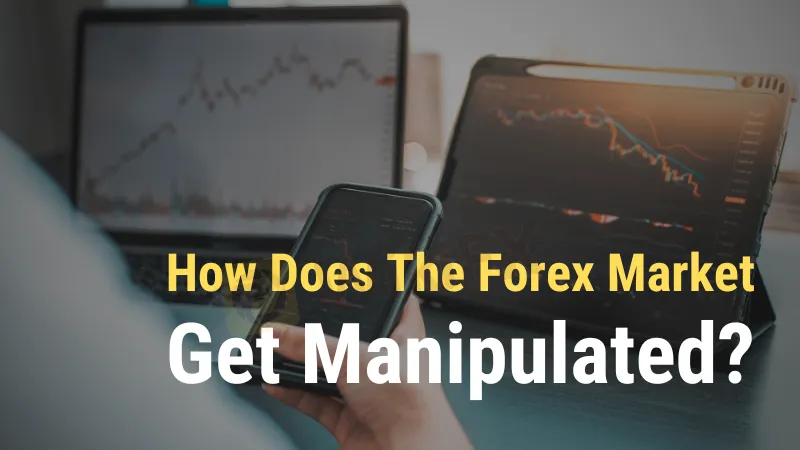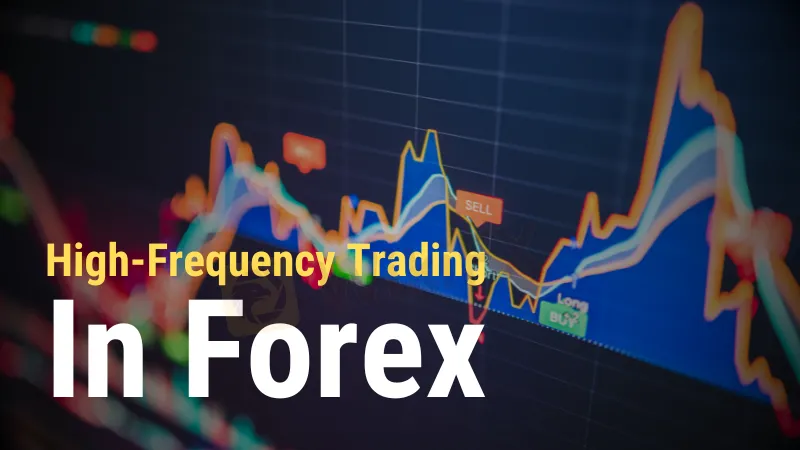简体中文
繁體中文
English
Pусский
日本語
ภาษาไทย
Tiếng Việt
Bahasa Indonesia
Español
हिन्दी
Filippiiniläinen
Français
Deutsch
Português
Türkçe
한국어
العربية
How Does The Forex Market Get Manipulated?
Abstract:Reveal the Ominous World of Forex Market Manipulation: Explore tactics, scandals, and the tense battle to safeguard your investments.

The foreign exchange (Forex) market is an expansive and highly liquid financial arena, where trillions of dollars change hands daily. It serves as the global hub for currency trading, facilitating transactions between nations, businesses, and individuals. Despite its reputation for transparency and efficiency, the Forex market is not immune to manipulation. In this comprehensive exploration, we will delve deeply into the intricate web of Forex market manipulation, unraveling its various forms and assessing the measures in place to prevent and detect these nefarious practices.
Forex Market Manipulation: An Overview
Market manipulation is a term that encompasses deliberate efforts to disrupt the normal functioning of a financial market, creating an uneven playing field where certain participants gain unfair advantages. Within the Forex market, manipulation can manifest in a multitude of ways. To understand the complexities of this issue, let's embark on an in-depth journey into the key aspects of Forex market manipulation.
Central Bank Interventions: Masters of Currency Control

Central banks wield substantial influence over exchange rates through their policy interventions. Here's an exploration of how they exert their control:
Currency Pegging: Some central banks opt to peg their domestic currency to a foreign counterpart, effectively fixing the exchange rate. Through the purchase or sale of vast quantities of their own currency, they can sway its value in the Forex market, impacting trading dynamics.
Interest Rate Policies: Central banks can manipulate exchange rates by adjusting their benchmark interest rates. Higher interest rates can lure foreign capital, bolstering the domestic currency's strength and, conversely, weakening it when rates are lowered.
Insider Trading in Forex: The Stealthy Advantage
Insider trading, a practice revolving around exploiting confidential or non-public information for trading purposes, has infiltrated the Forex market. In this realm, insider trading unfolds when individuals or entities gain access to sensitive economic data ahead of its public release, granting them an unfair edge in predicting currency fluctuations.
Government Officials' Role: High-ranking government officials privy to crucial economic data may harness this information for personal gain, leveraging it to make Forex trading decisions that favor their interests.
Economic Data Leaks: Instances have arisen where economic data has been leaked prematurely, allowing insiders to profit from their advanced knowledge before the data becomes public.
Currency Market Rigging Scandals: Real-World Intrigues
The annals of Forex market history are replete with scandals that have rattled the financial world. Notable cases include:
Libor Scandal: While primarily centered on interest rates, the Libor scandal also spotlighted manipulative practices that extended into currency markets.
Forex Benchmark Rates Manipulation: Traders at major banks were found to have conspired to manipulate benchmark currency rates, culminating in substantial fines and legal repercussions.
Role of Forex Brokers: Gatekeepers of the Market

Forex brokers occupy pivotal positions as intermediaries between retail traders and the broader market. While most brokers operate transparently, incidents have arisen where unscrupulous brokers engage in manipulative practices.
Stop Hunting: Certain brokers have faced allegations of engaging in stop hunting, strategically triggering stop-loss orders to cause losses for their clients.
Slippage Schemes: Manipulative brokers may tamper with order execution, intentionally creating slippage and causing traders to enter or exit positions at disadvantageous prices.
Price Fixing in Forex: Colluding for Profit
Price fixing in the Forex market takes shape when groups of traders collaborate to manipulate currency prices to their advantage. These nefarious endeavors encompass coordinated efforts aimed at artificially inflating or deflating exchange rates, disrupting the natural flow of market forces.
Algorithmic Trading and Forex Manipulation: The Rise of the Machines
Algorithmic trading has risen to prominence within the Forex market. While algorithms enhance liquidity and efficiency, they can also be harnessed for manipulative purposes:
Spoofing: Traders can employ algorithms to place substantial orders without any intention of executing them, generating a deceptive illusion of market demand or supply.
Front Running: Algorithms can be programmed to front-run large orders, profiting from anticipated price movements resulting from these orders.
Regulatory Measures to Prevent Forex Market Manipulation: Guardians of Fair Play
Regulatory bodies worldwide have taken robust measures to thwart and expose market manipulation within the Forex market. These measures encompass:
Enhanced Surveillance: Regulatory agencies have bolstered their surveillance capabilities to monitor trading activities rigorously and identify suspicious behavior promptly.
Fines and Penalties: Financial institutions found culpable of market manipulation face hefty fines and legal consequences as deterrents.
Transparency Mandates: Regulations necessitate that brokers divulge their trading practices and execution policies to their clients, fostering transparency.
High-Frequency Trading (HFT) in Forex: The Double-Edged Sword

High-frequency trading (HFT) encompasses the use of advanced algorithms and lightning-fast data access to execute an enormous volume of trades within milliseconds. While HFT can enhance market liquidity, it also presents risks:
Flash Crashes: HFT can contribute to abrupt and severe market fluctuations known as flash crashes, which can be exploited for manipulation.
Latency Arbitrage: HFT firms may indulge in latency arbitrage, capitalizing on minuscule delays in data transmission to secure profits.
Forex Market Manipulation and Economic Consequences: The Ripple Effect
Manipulation of the Forex market resonates far beyond trading terminals, yielding substantial economic consequences:
Exchange Rate Volatility: Market manipulation can engender erratic exchange rate fluctuations, impacting the competitiveness of nations and international trade relationships.
Investor Confidence: The specter of market manipulation erodes investor confidence, potentially deterring foreign investment in a nation's currency.
Forex Market Sentiment and Manipulation: The Power of Perception
Market sentiment and the influence of social media platforms are instrumental in shaping currency prices:
Herd Mentality: Traders often succumb to herd mentality, mirroring popular sentiment influenced by information disseminated through social media.
Rumors and Fake News: False narratives circulated on social media platforms can elicit panic or enthusiasm, precipitating significant currency value shifts.
Forex Market Manipulation Detection and Prevention: The Pursuit of Fairness
The detection and prevention of Forex market manipulation remain ongoing endeavors:
Machine Learning and AI: Regulators and market participants harness advanced technologies such as machine learning and artificial intelligence to identify suspicious trading patterns and unusual behaviors.
Whistleblower Programs: Encouraging whistleblowers to come forward with information regarding manipulative practices enhances the chances of detection.
Increased Transparency: Continued efforts to augment transparency within Forex markets serve to deter manipulation and promote fairness.
Bottom Line
The Forex market, a sprawling and intricate ecosystem, is susceptible to various forms of manipulation. In safeguarding this global financial bastion, a combination of regulatory oversight, technological advancements, and transparency measures stands as the bulwark against illicit practices. By gaining a profound understanding of the multifaceted nature of Forex market manipulation, traders and investors can navigate this financial arena with enhanced awareness and resilience, safeguarding their interests and preserving trust in the system.
For a deeper dive into Forex trading and market dynamics, explore https://www.wikifx.com/en.
In summation, comprehending the intricacies of Forex market manipulation is paramount for market participants. Armed with knowledge and equipped with vigilance, individuals can traverse the Forex landscape with confidence and integrity, preserving the essence of fairness and equity in this global financial arena.

Disclaimer:
The views in this article only represent the author's personal views, and do not constitute investment advice on this platform. This platform does not guarantee the accuracy, completeness and timeliness of the information in the article, and will not be liable for any loss caused by the use of or reliance on the information in the article.
Read more

Top 10 Trading Indicators Every Forex Trader Should Know
Master the top 10 Forex trading indicators to analyze real-time Forex quotes, trends, and market signals. Learn strategies to boost accuracy and avoid mistakes.

Malaysian Influencer Detained in Taiwan Over Alleged Role in Fraud Scheme
Malaysian influencer Hu Chang Mun, widely known as Ady Hu, has been detained in Taiwan for his alleged involvement in a fraudulent operation. The 31-year-old, who was reported missing earlier in December, was located by Taiwanese authorities after suspicions arose regarding his activities.

WikiEXPO Global Expert Interview: Simone Martin—— Exploring Financial Regulation Change
In the midst of financial innovation and regulation, WikiGlobal, the organizer of WikiEXPO, stays abreast of industry trends and conducts a series of insightful and distinctive interviews on pivotal topics. We are delighted to have the privilege of inviting Simone Martin for an in-depth conversation this time.

MultiBank Group Wins Big at Traders Fair Hong Kong 2024
Discover how MultiBank Group, a global leader in financial derivatives, secured three prestigious awards at Traders Fair Hong Kong 2024, highlighting its innovative trading solutions and industry excellence.
WikiFX Broker
Latest News
Geopolitical Events: What They Are & Their Impact?
Volkswagen agrees deal to avoid Germany plant closures
Top 10 Trading Indicators Every Forex Trader Should Know
TradingView Launches Liquidity Analysis Tool DEX Screener
MultiBank Group Wins Big at Traders Fair Hong Kong 2024
WikiEXPO Global Expert Interview: Simone Martin—— Exploring Financial Regulation Change
'Young investors make investment decisions impulsively to keep up with current trends' FCA Reveals
Why Do You Feel Scared During Trade Execution?
CySEC Settles Compliance Case with Fxview Operator Charlgate Ltd
Malaysian Influencer Detained in Taiwan Over Alleged Role in Fraud Scheme
Currency Calculator


